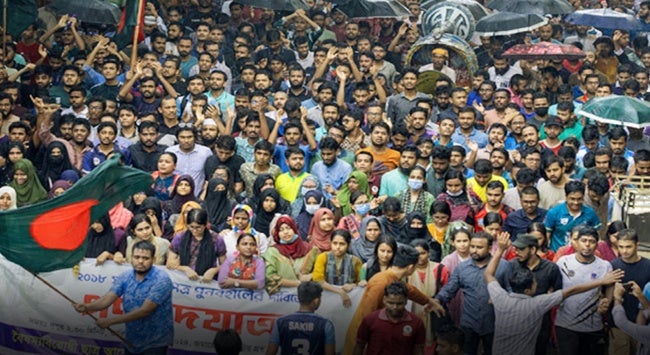Summary
The rise of the student-led National Citizens Party and the resurgence of the banned Islamist group, Hizbut Tahrir, reflect rival visions of state and society. However, their parallel emergence signals a volatile moment in Bangladesh’s politics, where both reformist and reactionary forces are vying to fill the vacuum left by the fall of the old order.
One of the most notable developments in recent weeks in Bangladesh has been the transformation of the country’s student-led protest movement into an organised political force. On 28 February 2025, the leaders of last year’s mass demonstrations formally launched the National Citizens Party (NCP). The party is led by 26-year-old Nahid Islam, who resigned from his post as acting head of the Ministry of Information and Broadcasting in the interim government to take on the role. At a rally near the national parliament, NCP leaders laid out a platform laid out a platform centred on unity, transparency, good governance and an independent foreign policy rooted in a vision for a “second republic”. Lima Akter, whose brother was killed during the July 2024 uprising, introduced Islam as the party’s convenor. Her prominent presence at the launch sought to link personal loss to a broader narrative of political renewal.
The formation of the NCP raises broader questions about how movements born in defiance of state power adapt to the structures of formal politics. Can such groups maintain their legitimacy and ideals once absorbed into the institutional frameworks they once opposed? Islam’s leadership signals a generational shift. However, his recent role within the interim government complicates the party’s claim to full independence and blurs the line between outsider reform and insider continuity.
While the NCP draws heavily on the symbolism of the July 2024 uprising, it faces the problem of product differentiation. As scholar and commentator Shafi Mostofa explains, “Other political parties, including the Bangladesh Nationalist Party [BNP] and Jamaat-e-Islami, have also claimed credit for the movement’s success.” This contest over revolutionary legitimacy may dilute the NCP’s distinctiveness – especially in the absence of a clearly defined ideological position – making it harder to assert itself as the sole political heir to the uprising or to distinguish itself from more established rivals. Its centrist stance may broaden its appeal, but it also risks blurring the boundaries between the NCP and the existing parties, weakening its ability to present a coherent political alternative.
While the NCP seeks to assert its revolutionary credentials, these efforts unfold amid broader shifts in Bangladesh’s political terrain and contestations over its national identity. Bangladesh’s Supreme Court recently upheld the High Court’s acquittal of former prime minister and BNP chairperson, Khaleda Zia, in a long-standing corruption case. The decision overturns her earlier seven-year jail sentence handed down by a lower court and serves to strengthen the BNP’s position as a resurgent political force. At the same time, the National Curriculum and Textbook Board has continued to introduce sweeping changes to school materials. All references to the recently ousted prime minister, Sheikh Hasina, have been removed, including her customary back-cover message to students. This has now been replaced with graffiti from the 2024 protests. Content related to Sheikh Mujibur Rahman, the founding president of Bangladesh, has also been reduced or rewritten to include other independence-era figures, while iconic images of Mujibur with former Indian prime minister, Indira Gandhi, have been deleted. These revisions showcase the intensifying symbolic struggle to control how the past is remembered and the future imagined.
Moreover, legal proceedings related to last year’s violence are also progressing. The Chief Prosecutor announced that a report on alleged crimes against humanity committed during the July-August 2024 crackdown may be filed by April 2025. A second case concerning enforced disappearances and extrajudicial killings is ongoing. The court may proceed in absentia if Hasina fails to return. Together, these proceedings mark a shift in Bangladesh’s legal landscape, and reflect a growing effort to confront the legacy of state violence under the previous regime.
Finally, the continued volatility of Bangladesh’s political landscape is perhaps best reflected in the high tensions on the streets. Police clashed with thousands of members of the banned Islamist group, Hizbut Tahrir, during a protest march in Dhaka which called for the establishment of a ‘Khilafat’, using batons and stun grenades to disperse the crowd after demonstrators breached barricades. That a banned organisation was able to mobilise thousands in central Dhaka is telling of the fragility of public order and the challenges facing the interim government. It signals, alongside the creation of the NCP, that the absence of a settled political order has created a vacuum, where different visions of the state are gaining traction and competing to shape Bangladesh’s future.
. . . . .
Dr Imran Ahmed is a Research Fellow at the Institute of South Asian Studies (ISAS), an autonomous research institute at the National University of Singapore (NUS). He can be contacted at iahmed@nus.edu.sg. The author bears full responsibility for the facts cited and opinions expressed in this paper.
Pic Credit: Nahid Islam (@NahidIslam_24) / X
-
 More From :
More From :
-
 Tags :
Tags :
-
 Download PDF
Download PDF



